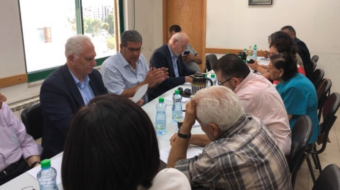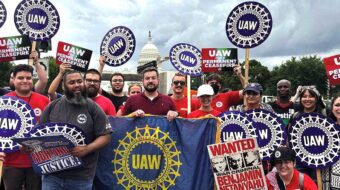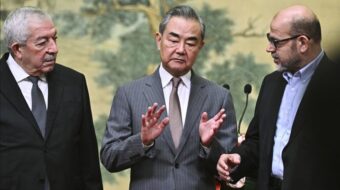
KIEV, Ukraine—Even as U.S. President Joe Biden declares Ukraine is a frontline democracy amidst its war with Russian invaders, Ukrainian unions would sharply differ with him.
Because if an independent non-government-controlled labor movement is a characteristic of a democracy, then Ukraine—whose current labor laws mimic weak U.S. labor law in many ways—is headed in the wrong direction, towards government control of the unions.
The Ukrainian government of President Vladomyr Zelensky enacted a new law in August to let it supersede the Federation of Trade Unions of Ukraine—the main labor federation—if it hasn’t done so already. Other federations would also come under government direction.
Hryhoryi Osovyi, chair of the Federation of Trade Unions of Ukraine (FPU), said, “If such a decree becomes law it would mean direct government intervention in trade union activity.” The FPU, with 54 unions, is Ukraine’s dominant labor federation.
The FPU also claims Ukrainian law enforcement targeted trade union property for confiscation or destruction “in an attempt to reduce their financial capacity,” Osovyi said.
Former Ukrainian parliamentarian Serhiy Kaplin, who introduced the new law, said its government-controlled Council of Trade Union Leaders “would enjoy a more positive relationship with the Ukrainian government” than the union federation does.
“This [council] is meant to solve problems, not to distance ourselves from the state or present ourselves as an autonomous force,” said Kaplin. Zelensky’s majority leader in Parliament supported the new law.
Knows about Zelensky’s law
The International Labour Organization (ILO) knows about Zelensky’s law, thanks to both Ukrainian unions and employers. It’s taken no stand, other than reporting on union and employer complaints.
Meanwhile, the two-year-long war following Russia’s invasion of Ukraine sees the FPU taking on new and different activities. It is “helping soldiers, refugees, and members that have lost their jobs as well as ensuring fundamental workers’ rights and basic living and working conditions are upheld,” says Grygorii Osovyi, the president of the labor federation.
And it doesn’t help that the war has destroyed so many businesses and institutions, including unionized industries such as railways, education, and nuclear power. All of that has caused dues contributions to the unions to plummet. Now, on top of that, the FPU faces the Zelensky government’s threat to push it out of the way.
“Documents obtained via freedom of information law show how two leading MPs from Ukraine’s ruling party proposed in July 2023 that the government set up a brand new ‘Council of Trade Union Leaders,’ in an explicit attempt to sidestep the government’s existing institution for dialogue with employers and trade unions.“The Ukrainian Cabinet of Ministers approved the initiative in August. According to trade union leaders, none of them have been informed about this new council, nor has it been announced publicly.”
An internet check of other organizations that monitor human rights worldwide showed that outside the International Labour Organization, nongovernment groups expected to pay attention to worker rights—such as Human Rights Watch—aren’t doing so in Ukraine.
With one exception: The U.S. State Department’s annual report on human rights worldwide, and it’s a year out of date.
The Ukrainian union confederation reported Zelensky’s plans and the union density collapse to the ILO last July in a workshop in the Ukrainian capital, Kiev. The workshop included 50 representatives from IndustriALL, a grouping of U.S. and European unions—including the Steelworkers–who have pledged to work together on joint projects, including organizing and worker rights.
“Both workers and employers expressed concerns about Ukraine’s ongoing labor law reform, citing a lack of social dialogue and potential reduction in workers’ protections,” ILO said. “They urged the government to engage in regular consultations with social partners to address the country’s significant challenges. Unions also emphasized they do not feel sufficiently included in the country’s rebuilding process.”
State’s most recent human rights worldwide report, issued last March, reports on Ukraine’s two old—and weak—labor laws. Ukrainian unions call those statutes “excessively complex and contradictory.”
“The law provides the right for most workers to form and join independent unions, to bargain collectively, and to conduct legal strikes. The law, however, establishes low penalties for noncompliance with collective bargaining agreements,” State said. Such small fines “are insufficient…making it easier to pay a penalty than to launch negotiations.
“There are no laws or legal mechanisms to prevent antiunion discrimination, although the labor code requires employers to provide justification for layoffs and firings, and union activity is not an acceptable justification. Legal recourse is available for reinstatement, back wages, and punitive damages, although observers described court enforcement as arbitrary and unpredictable, with damages too low to create incentives for compliance.”
We hope you appreciated this article. At People’s World, we believe news and information should be free and accessible to all, but we need your help. Our journalism is free of corporate influence and paywalls because we are totally reader-supported. Only you, our readers and supporters, make this possible. If you enjoy reading People’s World and the stories we bring you, please support our work by donating or becoming a monthly sustainer today. Thank you!












Comments